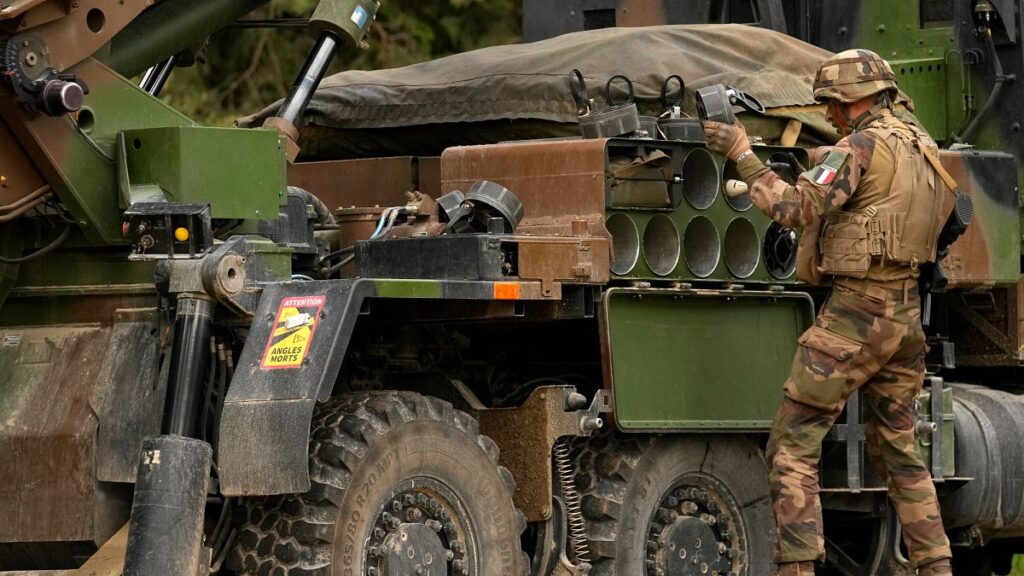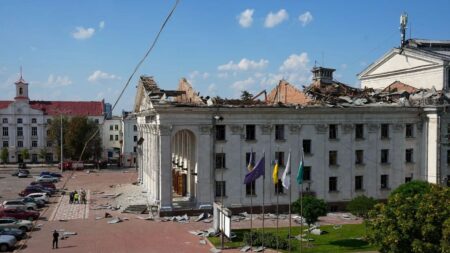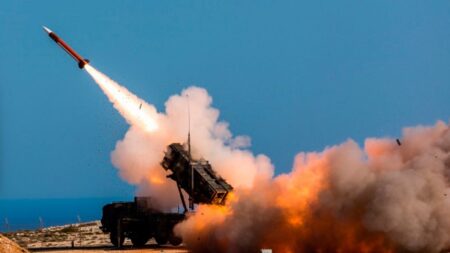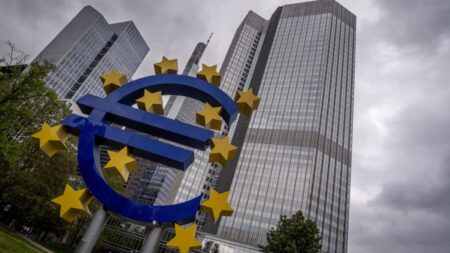Aluminium, silicon, titanium, nickel, germanium, copper and tantalum — all are standard components of a modern main battle tank, and all are scarce in Europe.
Europe produces just 1% to 5% of the critical raw materials it needs for key civilian and defence technologies — and demand is set to grow substantially in the years ahead.
By 2030, the EU anticipates a sixfold increase in demand for rare earth metals, while demand for lithium is projected to rise sevenfold by 2050.
These concerns aren’t new, but they’ve been intensified by the current geopolitical climate, Europe’s push for an energy transition, and the need for a more technologically advanced industrial base, according to a report by the International Institute for Strategic Studies (IISS).
In recent months, the EU has ramped up its rhetoric and actions around rearmament — or, as officials now frame it, “defensive readiness” in the face of a potential Russian attack on a member state. Still, while defence spending has taken centre stage, the crucial role of critical raw materials (CRMs) in the defence sector remains largely overlooked.
“Western states’ potential adversaries have, in some cases, a near-monopoly on the supply of vital materials that either are used in current defence platforms or are necessary to power European digital and industrial development and energy-transition ambitions,” IISS researchers warned.
From 2016 to 2020, China, the Democratic Republic of the Congo (DRC), Russia, South Africa and Turkey were the world’s top producers of 17 raw materials classified as “critical” by the European Commission last year.
During the same period, the EU was entirely reliant on China for imports of materials such as lithium, magnesium, phosphorus, scandium, titanium and vanadium.
China has long been investing in supply chain dominance — not only in mining, but also in refining and processing capabilities. Combined with ongoing uncertainty over US trade policy, access to critical raw materials — particularly in usable form — remains “uncertain”, said Rebecca Lucas, senior defence analyst at RAND Europe.
“The EU will certainly need to understand what alternatives exist to current sources of critical raw materials and pursue policies that enable them to maximise the diversity of their sources,” Lucas recommended.
The European aerospace, security and defence industries share a similar view. “Diversification is essential, and our industry is actively pursuing alternative sources, strengthening resilience, and reducing single-point dependencies wherever possible,” a spokesperson from the Aerospace, Security & Defence Industries Association of Europe (ASD) told Euronews.
In May 2024, the European Commission presented its answer to reducing these dependencies: the Critical Raw Materials Act — a regulation aimed at boosting domestic capacity, diversifying imports, and promoting recycling.
By 2030, the EU Commission intends to ensure that 10% of the EU’s annual demand is met through domestic extraction, 40% through domestic processing, and 25% through recycling within the EU. The regulation also aims to limit dependency on any individual third country for a specific CRM to no more than 65%.
Yet the gap between ambition and supply remains wide — and the implementation of these plans is where the real challenge lies. “Continuing to ensure a shared understanding of goals and objectives will be a key enabler here — as will maintaining an accurate mapping of European defence industrial capacity,” Lucas argued.
According to the ASD, although CRM dependence varies across defence systems and equipment, there is no doubt that secure, predictable access to critical raw materials is “indispensable” to Europe’s defence and rearmament goals.
“The evolving geopolitical landscape has significantly increased the exposure and fragility of critical supply chains,” the ASD spokesperson said. “Any disruption to these flows could severely impact defence readiness and industrial output, with potential consequences for European security and resilience.”
Without secure access to CRMs (including rare earths), supply chains could collapse, production may slow or stop, and capability gaps could emerge.
The EU is increasingly attempting to diversify both the materials it uses and their sources, Gregor Nägeli, a parliamentary advisor from the European People’s Party, told Euronews. “But when not possible, we need to diversify — and diversify also to reliable partners, partners we trust like Australia, Canada, South American partners,” said Nägeli, who also serves on the European Critical Raw Materials Board.
Is stockpiling the solution?
Overdependence on foreign suppliers creates vulnerabilities for European industries — and could even jeopardise the bloc’s rearmament efforts, according to the analysts, industry representatives and policymakers consulted by Euronews.
At the national level, countries like France, Germany and Spain have introduced legislation and strategies to prepare for possible supply disruptions.
France’s 2024–30 military programming law makes stockpiling mandatory for companies active in defence and allows all production activities to be redirected to the armed forces in times of emergency. Spain’s 2023 Defence Industrial Strategy also includes recommendations to strengthen supply chains and secure access to raw materials.
But stockpiling at the EU level is far more complex — and will take time.
“Stockpiling would be able to help mediate some of the issues, but this is not a golden bullet for all materials,” stressed Nägeli.
Some materials require very specific grades, quantities, and storage conditions — and such details are highly sensitive, so companies are often reluctant to share them with any governmental body, including the EU itself.
The European defence and industry sector acknowledges that in the coming years, building up domestic extraction, processing and recycling capacity will be essential — as will investing in research and innovation to support the substitution of critical raw materials.
“The key now is to implement the Critical Raw Materials Act in spirit and extend the partnerships we have started establishing with other nations — and actually implement them,” the EPP policy advisor concluded.
Read the full article here

















